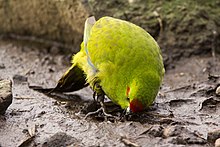| Reischek's parakeet | |
|---|---|

| |
| Conservation status | |
 Range Restricted (NZ TCS) | |
| Scientific classification | |
| Domain: | Eukaryota |
| Kingdom: | Animalia |
| Phylum: | Chordata |
| Class: | Aves |
| Order: | Psittaciformes |
| Family: | Psittaculidae |
| Genus: | Cyanoramphus |
| Species: | C. hochstetteri |
| Binomial name | |
| Cyanoramphus hochstetteri (Reischek, 1889) | |
Reischek's parakeet (Cyanoramphus hochstetteri) is a small green parrot confined to 21 km (8.1 sq mi) Antipodes Island, one of New Zealand’s subantarctic islands, which it shares with a congener, the larger Antipodes parakeet.
Taxonomy
The common name commemorates pioneering naturalist and collector Andreas Reischek, who collected specimens of the parrot in 1888 and who named it Platycercus hochstetteri for the son of his friend, Austrian geologist Ferdinand von Hochstetter, who made a geological survey of New Zealand.
Reischek’s parakeet was previously considered to be a subspecies of the red-crowned parakeet C. novaezelandiae, which it resembles in appearance, but was later lumped with the Macquarie parakeet from Macquarie Island in a 2001 paper by Wee Ming Boon and others following an examination of the molecular systematics of the genus which found that many of the red-crowned parakeet subspecies should be elevated to full species. However, subsequently the provenance of Boon et al.’s supposed Macquarie Island material was shown to be mistaken, originating from the Antipodes Islands instead.
Behaviour
Feeding
Reischek’s parakeet feeds on tussock flowers, leaves, seeds, berries as well as invertebrates such as fly larvae in the guano of the penguin colonies. It also scavenges on the carcasses of petrels and albatrosses.
Conservation
Though the population of Reischek's parakeet is healthy, its limited distribution makes it potentially vulnerable to events such as the accidental introduction of rodents to its island home. On the New Zealand Threatened Species classification it is listed as ‘range restricted’.
References
- "New Zealand Threat Classification System". New Zealand Department of Conservation. Retrieved 2015-01-04.
- Reischek, A. (1888). Notes on the Islands to the South of New Zealand. Transactions and Proceedings of the New Zealand Institute 21: 378-389.
- Boon, Wee Ming; Kearvell, Jonathan C.; Daugherty, Charles H.; & Chambers, Geoffrey K. (2001). Molecular systematics and conservation of kakariki (Cyanoramphus spp.). Science for Conservation 176. Dept of Conservation:Wellington, New Zealand. ISBN 0-478-22031-6
- Scofield, R. Paul. (2005). The supposed Macquarie Parakeet in the collection of Canterbury Museum. Notornis 52(2): 117-120
- Chambers, Geoffrey K.; & Boon, Wee Ming. (2005). Molecular systematics of Macquarie Island and Reischek's parakeets. Notornis 52 (4): 249–250.
- Greene, Terry C. (1999). Aspects of the ecology of Antipodes Parakeet (Cyanoramphus unicolor) and Reischek's Parakeet (C. novaezelandiae hochstetteri) on Antipodes Island, October - November 1995. Notornis 46: 301-310. Archived 2007-06-28 at the Wayback Machine
- Warham, J.; & Bell, B.D. (1979). The birds of the Antipodes Islands, New Zealand. Notornis 26(2):121-170.
- TerraNature: Reischek’s Parakeet
| Taxon identifiers | |
|---|---|
| Cyanoramphus hochstetteri |
|